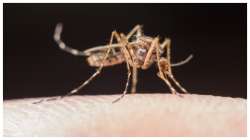Diet for Dengue Recovery: Nourishing foods to boost platelet count and accelerate healing
During dengue recovery, a thoughtfully curated diet becomes pivotal in aiding your body's healing. Dengue commonly results in reduced platelet count, vital for blood clotting. Certain foods can facilitate enhanced platelet count and expedite the healing process.

When recovering from dengue, a carefully chosen diet can play a crucial role in supporting your body's healing process. Dengue can often lead to a decrease in platelet count, which is essential for blood clotting. Consuming specific foods can help improve platelet count and promote a faster recovery. Here's how you can create a dengue recovery diet:
- Hydration: Staying hydrated is paramount during dengue recovery. Drink plenty of water, coconut water, and clear soups to maintain electrolyte balance and aid in flushing toxins from your body.
- Fresh Fruits: Incorporate a variety of fresh fruits rich in vitamin C, such as oranges, strawberries, kiwi, and papaya. Vitamin C is known to boost immunity and support the body's natural healing processes.
- Leafy Greens: Include leafy greens like spinach and kale, as they are rich in vitamins and minerals that contribute to overall health and recovery.
- Protein-Rich Foods: Lean proteins like chicken, fish, tofu, and lentils provide essential amino acids that aid in tissue repair and immune system support.
- Healthy Fats: Include sources of healthy fats like avocados, nuts, seeds, and olive oil. These fats help in absorbing fat-soluble vitamins and support overall body functions.
- Pomegranate: Pomegranate is known to enhance blood platelet production and is often recommended during dengue recovery.
- Ginger and Turmeric: These anti-inflammatory spices can aid in reducing inflammation and support the immune system.
- Fluid-Rich Foods: Foods with high water content, such as watermelon and cucumbers, can contribute to hydration and help maintain electrolyte balance.
- Avoid Junk Food: Steer clear of processed and fried foods, as they can hinder your recovery by providing empty calories and unhealthy fats.
- Small, Frequent Meals: Opt for smaller, frequent meals to prevent any strain on your digestive system and maintain energy levels.
Remember, each person's tolerance to different foods can vary during recovery, so listen to your body and choose foods that sit well with you. If you experience difficulty eating solid foods, consider smoothies, soups, and easily digestible options.
ALSO READ: Rolled oats vs Steel-Cut oats: Which is better?